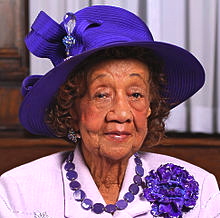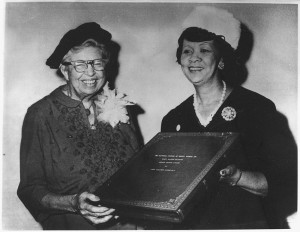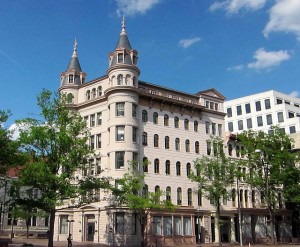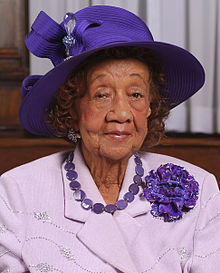Dorothy Height

Dorothy Height (born 1912-died 2010): Civil Rights Leader Remembered for Lifelong Activism
 President Obama, First Lady Michelle Obama, along with hundreds of mourners, packed into the National Cathedral in Washington, DC on Thursday to attend the funeral of civil rights and women’s rights leader Dorothy Height. She died last week at the age of ninety-eight. We speak with Stanford University professor Clayborne Carson.
President Obama, First Lady Michelle Obama, along with hundreds of mourners, packed into the National Cathedral in Washington, DC on Thursday to attend the funeral of civil rights and women’s rights leader Dorothy Height. She died last week at the age of ninety-eight. We speak with Stanford University professor Clayborne Carson.
TRANSCRIPT
This is a rush transcript. Copy may not be in its final form.
AMY GOODMAN: President Obama, First Lady Michelle Obama, along with thousands of mourners, packed into the National Cathedral in Washington, DC Thursday to attend the funeral of civil rights and women’s rights leader Dorothy Height. She died last week to the age of ninety-eight.
Dorothy Height served as president of the National Council of Negro Women for forty years, where she fought for equal rights for both African Americans and women. During the 1960s, she organized Wednesdays in Mississippi, which brought together black and white women from the North and South to create a dialog of understanding. She worked closely with Dr. Martin Luther King, Jr. and many other prominent civil rights activists. In 1971, she helped found the National Women’s Political Caucus. And in the last months of her life, she took part in healthcare discussions at the White House.
At the funeral service on Thursday, Camille Cosby and poet Maya Angelou were among those who paid tribute to Dorothy Height. President Obama weeped during the service before taking to the podium to deliver a thirteen-minute eulogy. He hailed her achievements and ended by recounting one of his favorite stories about Dorothy Height.
PRESIDENT BARACK OBAMA: One of my favorite moments with Dr. Height, this is just a few months ago. We had decided to put up the Emancipation Proclamation in the Oval Office, and we invited some elders to share reflections of the movement. And she came. And it was an inter-generational event, so we had young children there as well as elders, and the elders were asked to share stories.
And she talked about attending a dinner in the 1940’s at the home of Dr. Benjamin Mays, then president of Morehouse College. And seated at the table that evening was a fifteen-year-old student, a gifted child, as she described him, filled with a sense of purpose, who was trying to decide whether to enter medicine or law or the ministry. And many years later, after that gifted child had become a gifted preacher — I’m sure he had been told to be on his best behavior — after he led a bus boycott in Montgomery and inspired a nation with his dreams, he delivered a sermon on what he called the “drum major instinct,” a sermon that said we all have the desire to be first, we all want to be at the front of the line. The great test of life, Dr. Martin Luther King, Jr. said, is to harness that instinct, to redirect it towards advancing the greater good, towards changing a community and a country for the better, toward doing the Lord’s work.
I sometimes think Dr. King must have had Dorothy Height in mind when he gave that speech, for Dorothy Height met the test. Dorothy Height embodied that instinct. Dorothy Height was a drum major for justice, a drum major for equality, a drum major for freedom, a drum major for service. And the lesson she would want us to leave with today, the lesson she lived out each and every day, is that we can all be first in service, we can all be drum majors for a righteous cause. So let us live out that lesson. Let us honor her life by changing this country for the better, as long as we are blessed to live. May God bless Dr. Dorothy Height and the union that she made more perfect.
AMY GOODMAN: President Obama delivering the eulogy at the funeral service for Dorothy Height yesterday. Obama ordered flags to be flown at half-staff on Thursday in Height’s honor.
Before we look at her life and legacy, we go back to Dorothy Height in her own words. In 2005, she spoke before a massive crowd assembled on the National Mall in Washington, DC for the Millions More March.
Dorothy Irene Height, (born March 24, 1912 – died April 20, 2010) an American administrator and educator, was a civil rights and women’s rights activist specifically focused on the issues of African-American women, including unemployment, illiteracy, and voter awareness. She was the president of the National Council of Negro Women for forty years and was awarded the Presidential Medal of Freedom in 1994 and the Congressional Gold Medal in 2004.
Early Life
Dorothy Height was born in Richmond, Virginia. During childhood, she moved with her family to Rankin, Pennsylvania, a steel town in the suburbs of Pittsburgh, where she graduated from Rankin High School in 1929. Height received a scholarship from the Elks, which helped her to attend college. She was admitted to Barnard College in 1929, but upon arrival was denied entrance because the school had an unwritten policy of admitting only two black students per year. She enrolled instead at New York University, earning an undergraduate degree in 1932 and a master’s degree in educational psychology the following year. She pursued further postgraduate work at Columbia University and the New York School of Social Work (the predecessor of the Columbia University School of Social Work).
Career
 Dorothy Height with Eleanor Roosevelt, 1960
Dorothy Height with Eleanor Roosevelt, 1960
Height started working as a caseworker with the New York City Welfare Department, and at the age of 25, she began a career as a civil rights activist, joining the National Council of Negro Women. She fought for equal rights for both African Americans and women. In 1944 she joined the national staff of the YMCA. She was also an active member of Delta Sigma Theta Sorority throughout her life, developing leadership training programs and ecumenical education programs. She served as national president of the sorority from 1946 to 1957.
In 1957, Height was named president of the National Council of Negro Women, a position she held until 1997. During the height of the civil rights movement of the 1960’s, she organized “Wednesdays in Mississippi,” which brought together black and white women from the North and South to create a dialogue of understanding.
American leaders regularly took her counsel, including First Lady Eleanor Roosevelt.[clarification needed] Height encouraged President Dwight D. Eisenhower to desegregate schools and President Lyndon B. Johnson to appoint African-American women to positions in government. In the mid-1960s, she wrote a column called “A Woman’s Word” for the weekly African-American newspaper the New York Amsterdam News, and her first column appeared in the March 20, 1965, issue on page 8.
Height served on a number of committees, including as a consultant on African affairs to the Secretary of State, the President’s Committee on the Employment of the Handicapped, and the President’s Committee on the Status of Women. In 1974, she was named to the National Commission for the Protection of Human Subjects of Biomedical and Behavioral Research, which published The Belmont Report, a response to the infamous “Tuskegee Syphilis Study” and an international ethical touchstone for researchers to this day.
Later Life and Death
 The Dorothy I. Height Building, headquarters of the National Council of Negro Women, located on Pennsylvania Avenue in Washington, D.C.
The Dorothy I. Height Building, headquarters of the National Council of Negro Women, located on Pennsylvania Avenue in Washington, D.C.
In 1990, Height, along with 15 other African Americans, formed the African-American Women for Reproductive Freedom. Height was recognized by Barnard for her achievements as an honorary alumna during the college’s commemoration of the 50th anniversary of the Brown v. Board of Education decision in 2004.
The musical stage play If This Hat Could Talk, based on her memoirs Open Wide The Freedom Gates, debuted in 2005. The work showcases her unique perspective on the civil rights movement and details many of the behind-the-scenes figures and mentors who shaped her life, including Mary McLeod Bethune and Eleanor Roosevelt.
Height was the chairperson of the Executive Committee of the Leadership Conference on Civil Rights, the largest civil rights organization in the USA. She was an honored guest at the inauguration of President Barack Obama on January 20, 2009, and was seated on the stage.
She attended the National Black Family Reunion, celebrated on the National Mall in Washington, D.C., every year until her death in 2010.
On March 25, 2010, Height was admitted to Howard University Hospital in Washington D.C. for unspecified reasons. She died three weeks later, on April 20, 2010, at the age of 98. Her funeral service at the Washington National Cathedral on April 29, 2010 was attended by President Barack Obama and First Lady Michelle Obama, as well as many other dignitaries and notable people.[10] She was later interred at Fort Lincoln Cemetery in Colmar Manor, Maryland.
Personal Life
According to a family history DNA analysis performed by African Ancestry Inc., Height’s maternal line has a root among the Temne people of modern-day Sierra Leone.
Awards and Honors
Presidential Citizens Medal (1989)
Spingarn Medal from the NAACP (1993)
Franklin Delano Roosevelt Freedom From Want Award (1993)
inducted into the National Women’s Hall of Fame (1993)
Presidential Medal of Freedom (1994)
7th Annual Heinz Award Chairman’s Medal (2001)
National Jefferson Award for Greatest Public Service Benefiting the Disadvantaged (2001)
Listed on Molefi Kete Asante’s list of 100 Greatest African Americans (2002)
Congressional Gold Medal by President George W. Bush on behalf of the United States Congress (Approved, 2003) (Awarded, 2004)
2009 Foremothers Lifetime Achievement Award from the NRC for Women & Families
Upon her death, President Barack Obama ordered flags to be flown at half-mast on April 29, 2010 in her honor.
On May 21, 2010, a callbox was dedicated to Height. It is located on 7th Street, SW, in front of the last building in which she lived.
On March 24, 2014, in celebration of the 102nd anniversary of her birthday, Google featured a doodle with a portrait of Ms. Height above protestors marching with signs.


